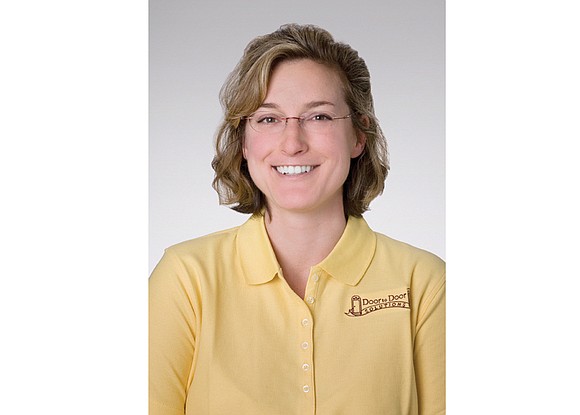Personality: Kathryn ‘Katie’ Hamann
Spotlight on chair of Alzheimer’s Association of Greater Richmond
10/30/2016, 11:40 a.m.
Kathryn Ayn “Katie” Hamann is dedicated to raising awareness about Alzheimer’s disease.
Her volunteer efforts with the Alzheimer’s Association of Greater Richmond began 13 years ago. That’s when, through her work with Door to Door Solutions, a company specializing in helping senior citizens to relocate, she realized many families are dealing with a loved one with dementia.
“I wanted to learn more about the disease in order to fully serve our clients,” Ms. Hamann recalls. “I reached out to the Alzheimer’s Association to become involved, primarily with raising funds and creating awareness so that folks in our community who could benefit would know about it.
“It became clear that my role was to serve as a conduit to connect those with the disease with resources to help them.”
Today, Ms. Hamann is chair of the board of the Greater Richmond chapter of the Alzheimer’s Association.
She’s hoping this year’s Walk to End Alzheimer’s on Saturday, Nov. 5, will continue to grow community awareness about the disease and raise funds for research, treatment and care, especially for the thousands of people in the Richmond area affected by the disease.
Officials estimate that 130,000 Virginians have Alzheimer’s disease, with 26,000 living in the Greater Richmond area. According to the Alzheimer’s Association, African-Americans are two times more likely than white people to develop late-onset Alzheimer’s disease and less likely to have a proper diagnosis.
The disease slowly ravages a person’s short- and long-term memory that can disrupt daily life. Among the signs: Confusion with time or place, difficulty completing familiar tasks at home or work, challenges in planning or solving problems, trouble understanding visual images and spatial relationships.
“Stories need to be shared. Money needs to be donated. Discussions of what this disease looks like — good and bad — need to take place,” Ms. Hamann says.
The Alzheimer’s Association offers a 24-hour hotline — (800) 272-3900 — to help both caregivers and people with the disease. The association also offers care consultations, referral services, respite programs for caregivers and educational programs, including safe return education programs to help deal with dementia problems that cause some elderly people to wander. Most of the association’s services are free.
Ms. Hamann wants the association’s programming to reach all segments of the community.
“Many individuals in underserved areas do not know that the Alzheimer’s Association has an office in Richmond and they are, therefore, unaware of the support and services that the association provides,” she said.
Ironically, the biggest challenge for the Michigan native is not managing her chapter’s $1.5 million budget or more than 300 volunteers; it’s getting people in Richmond to talk about the disease.
“We want people to speak about this disease and not live with it in fear or hiding, but place it in the light so they can receive help and support.”
Meet this week’s advocate for understanding Alzheimer’s disease and Personality, Katie Hamann:
Date and place of birth: Nov. 18, in Ann Arbor, Mich.
Current residence: Brandermill.
Occupation: President, Door to Door Solutions.
Alma mater: Bachelor’s of science in marketing and management, University of Richmond.
Family: Donnie Harper is my partner in life. No kids. Two cats.
When Alzheimer’s Association of Greater Richmond was established: We established our local chapter in 1981.
Mission of Alzheimer’s Association of Greater Richmond: The mission of the Alzheimer’s Association is to eliminate Alzheimer’s disease through the advancement of research, to provide and enhance care and support for all affected, and to reduce the risk of dementia through the promotion of brain health.
What is Alzheimer’s disease: Alzheimer’s is a progressive disease that destroys brain cells, causes problems with memory, thinking and behavior.
What is dementia: Dementia is a general term used to describe a decline in cognitive functioning.
How to deal with an Alzheimer’s or dementia diagnosis: When someone receives an Alzheimer’s or dementia diagnosis, they should contact the Alzheimer’s Association Greater Richmond Chapter at (804) 967-2580 or our 24-hour Helpline at (800) 272-3900. The association can provide the person with the disease and their family members with information and referral services to help them access necessary resources. We offer free care consultations to help navigate this disease.
Role of Alzheimer’s Association: We exist to improve the lives of those living with the disease and their caregivers. The Alzheimer’s Association is the world’s leading voluntary health organization in Alzheimer’s care, support and research. The association provides care and support to all those affected.
Importance of family support: So critical! This diagnosis is so devastating for spouses, family and friends. An Alzheimer’s diagnosis affects the entire family. Spouses, children, relatives and friends rearrange their lives and careers to be there for their loved ones. For each person with Alzheimer’s, there are many family members whose lives are changed forever. That is why the Alzheimer’s Association offers information, resources, care, support and community to people living with dementia and their loves ones. Understanding the disease, and knowing what to expect, can positively impact your interactions with your loved one. Additionally, with families so spread out around the state or country, it is important to prepare for the changes you may experience due to a lapse of time between visits.
What needs to be done: Stories need to be shared. Money needs to be donated.
What is a brain-healthy lifestyle: A brain-healthy lifestyle includes staying mentally active, engaging in regular physical activity, taking care of your health, eating a heart-healthy diet that benefits both your body and your brain and staying socially engaged in your community.
Research has suggested that combining good nutrition with mental, social and physical activities may have a greater benefit in maintaining or improving brain health than any single activity.
Strong positive, loving relationships also are vital.
What is young-onset dementia: It is very rare to show signs of dementia before age 40, but unfortunately the disease can occur in your 40s or 50s.
Who or what influenced me to do what I do: My parents taught me to be others-centered and empathetic. It serves me well in every aspect of my life. When you serve others, the rewards of giving far exceed the work you do.
Best late-night snack: Popcorn!
Greatest source of inspiration: Meditation and walking. Knowing that we always have choices and we can always make new choices if needed. My clients who have lived full lives remind me every day to live selflessly and fully.
Three words that best describe me: Energetic, creative and controlling.
Nobody knows that I: Can moonwalk pretty well, especially in socks! What can I say, I grew up with rap, hip-hop and enamored with Prince and Michael Jackson. Yes, I was lucky enough to attend the “Purple Rain” concert when I was 12 in Cleveland, Ohio.
Book that influenced me the most: “You Can Heal Your Life” by Louise Hay.
What I’m reading now: Reading? I wish!
Who or what influenced me to do what I do: I’ve been a service-centered person since I was little. When Mom said, “How do you think that makes that person feel?” I took it a little too seriously and, ultimately, I always think about how everyone feels. I’ve always loved to help. Again, Mom praised me a lot and always said, “You’re such a good helper,” and it stuck!
When I look in the mirror, I see: Opportunity!
If I’ve learned one thing in life: It is that we get what we give. If I’ve learned two things in life, it is that our thoughts, and, ultimately, our words are very powerful and can change lives — easily! Use them both wisely.
Ultimate goal: To meet the first survivor of Alzheimer’s disease.







